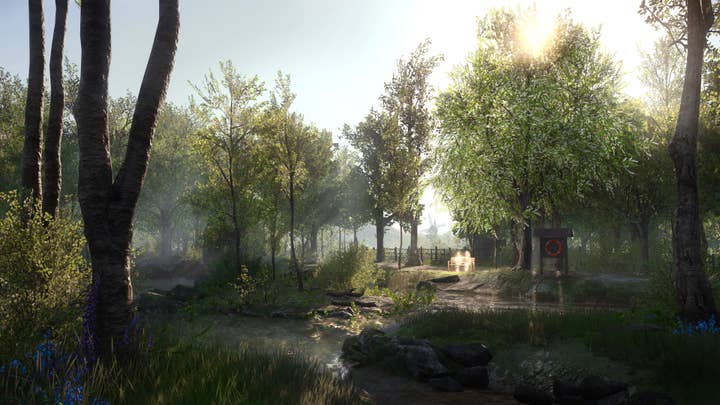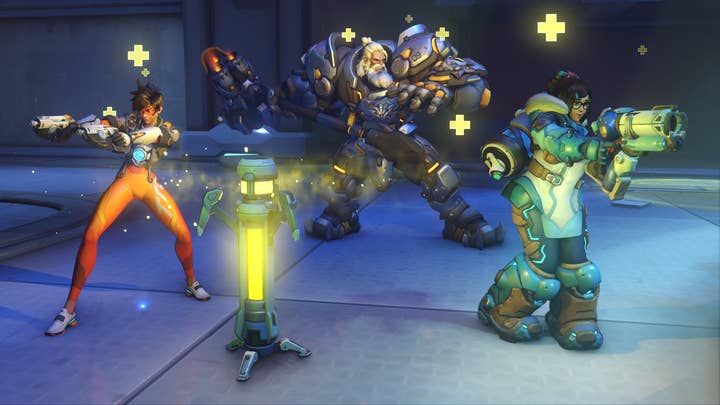How to get a job in the games press
The GamesIndustry.biz Academy looks into how to get a job as a games journalist
Finding a job in the games industry is no easy task. Our guides can help you figure out whether you're on the right path to land the games industry work of your dreams. You can read our other in-depth guides on how to get a job in the games industry on this page, covering various areas of expertise.
There are as many paths leading to games journalism as there are games journalists out there. While on paper that could mean it's easy to build a career in the field, the reality is less rosy -- you'll have to fight to earn a place in this very competitive landscape.
The recent rise of video-based reporting further disrupted a sector that has been shaken to its core over the last decade, with print circulation in massive decline. Internet use doubled in the UK between 2008 to 2018, according to the UK's Office for National Statistics, while the Reuters Institute for the Study of Journalism reported in 2018 that 74% of UK adults used "online methods" to find news each week -- a figure that rises to 91% for 18 to 24 year olds.
While these are UK statistics, they are representative of a much wider trend. In the games press, that trend has resulted in the closure of many beloved magazines, but when one door closes, another opens. The decline in print also led to a rise in demand for multimedia journalists in emerging formats such as video and podcasts, and the skills required in a good journalist are very different now compared to what they were ten or even five years ago.
Depending on the type of job you're aiming for, you'll need to be proficient in a wide array of skills. It isn't enough anymore to simply be a good writer. Do you know how to edit a podcast? Do you know how to brief someone so they answer appropriately in a video interview? Do you know your SEO? Do you have a legal understanding of what libel is? Do you know how to structure news?
There isn't one path to a career in games journalism. There are many approaches, and combining them in a smart manner will give you the best chance of achieving your goal.
What education do I need to get a job in the games press?
Formal training is a contentious issue in journalism in general, and games journalism in particular. Some believe education is crucial to grasping the basics, while others insist there's no better way to learn than practice in real life. There is truth on both sides of the debate.
"I went to university and studied English Language, with a minor in Journalistic Studies -- both have been really useful," says Alex Donaldson, assistant editor at VG247 and publisher of the Mist Network websites. "By the time I went to uni I already knew I wanted to work in the games media for a living, but I didn't really go to uni in order to expand my skill-set specifically for that. A lot of really talented people in the field -- perhaps the majority -- didn't go at all, and there's an awful lot of 'on the job' training in games media."
"I don't think formal training is crucial, but it certainly won't hurt"
Alice Bell, Rock Paper Shotgun
Alice Bell, deputy editor at Rock Paper Shotgun, doesn't have formal training in journalism, and while she believes you don't necessarily need it either, there are a few important topics that aspiring journalists should study.
"I don't think formal training is crucial, but it certainly won't hurt, especially if you want to go into news writing," she says. "Something that really helps? Legal training -- defamation, usage rights, all the law stuff that applies to media. Most of us don't have any training in that, which is pretty shocking really."
With games journalism, it's possible to have a seemingly unrelated education and still build a career. Transferable skills can be found in unexpected places, as GamesRadar staff writer Rob Dwiar discovered on his path into the games press.
"My formal training consists of a BSc and a PG Dip in Landscape Design, almost as far removed from any journalism or creative writing degree that you can get," he says. "This training still gave me a host of transferable skills that made me better prepared, not to mention the niche knowledge that got me into games writing in the first place."
What do I need to get noticed in the games press?
Bell, Donaldson and Dwiar represent three different paths to games, so if you don't have formal training there are still many ways to launch a career. Combining them will maximise your chances.
- Do volunteer work, seek internships and write for yourself
One route to paid commissions is volunteer work, but tread very carefully. There's a thin line between free labour that will help your career and being exploited by an unscrupulous employer. Donaldson knows this path better than most -- he studied journalism, but volunteering was a springboard for his career.
"Don't work with those who might exploit you, and measure your experience and the quality of your work," he says. "Know when it's time to start going to places with your new experience in order to ask for cash. I did a lot of volunteer work that eventually came to fruition and allowed me to transition to more traditional work. The volunteer work was both for websites that I co-founded -- and still co-own to this day -- and other fledgling 'hobbyist' websites.
"I was very young when I founded my first few websites. That was a completely different time for the internet, but I think the broad concept of 'doing your own thing' is a pretty valid route at any age. I was able to point to the work I'd done for myself and for free elsewhere, to begin building a portfolio and reputation to secure paid work."

Doing your own thing can simply mean creating a blog, a YouTube channel, or writing Medium posts once in a while -- anything that gives you something to show a potential employer. Bell wrote for her university paper, for instance, and used work experience as a route to paid employment.
"Uni papers are nothing like real media, but they're still good on the ol' CV," she says. "I did work experience at Official Xbox Magazine for two weeks, and did well enough that they paid me to do some more, and had me in-house for a month to help on an issue."
- If at all possible, go to events
Attending events isn't necessarily easy for a variety of reasons: you may live in a remote area, travel costs could be prohibitive, or mobility may be an issue. However, it's a valuable way to make contacts, and nothing beats real life networking.
"Income from [freelance work] was combined with student grants in order to take myself to events like E3 and Leipzig Games Convention [now known as Gamescom]," Donaldson says. "These events were pretty key for me in meeting people and fully understanding how the industry works. When you're at home writing you can have fantastic knowledge but still live a pretty sheltered existence that places a ceiling on your ability to advance.

"Events allow you to do a few key things. First, you can make contacts. What you know is important, but so is who you know -- an editor who can put a real-life face to a name might be more likely to remember you. Meeting game developers and publisher representatives in person can likewise open access doors that can lead to great places.
"I realise that not everybody is comfortable putting themselves out there at events, and that's okay -- it isn't for everyone. But if you're able to do this, it can help significantly. My first convention and trade show experiences were ultimately life-changing."
What qualities and skills do I need to work in the games press?
- Be passionate about writing, and not just the games
While your education doesn't matter that much, you should be able to demonstrate your ability with a portfolio of written work. Most roles will involve writing in some form, so not only do you need to know how to write, you need to enjoy it, too. It may sound odd, but some think a passion for games is enough.
"More than anything, [you need to] like writing, care about writing," Bell explains. "Like games, sure, of course. But day-to-day, the writing is what you'll be doing most of. If you don't want to be a writer more than you want to work in games, you'll go mad, and should look for a different route into the games industry."
Donaldson adds: "Tenacity and passion are really important, simply because this is a harder thing to do than a lot of people realise. The pay often isn't great, the schedule can be punishing, and the audience isn't always grateful. All of these things are fine, but you have to really want the job to do it and walk away happy."
- Be inquisitive, open, and cool under pressure
Most jobs in the press will ask you to publish original stories to set deadlines. You need to be able to write under pressure, identify which stories are interesting, and find ways to bring something fresh to each one.
"More than anything, you need to like writing, care about writing"
Alice Bell, Rock Paper Shotgun
"The ability to sniff out something interesting is a skill itself," Dwiar says. "Being keen, inquisitive, and open-minded are all good skills or attributes to have, too."
Keeping an open-mind is particularly important for two reasons: improvement often comes as the result of criticism, and you'll need to cover topics you have no strong personal passion for.
"Be open to notes from editors, no matter how brutal," Donaldson says. "Be open to new video game experiences. No matter how well defined your tastes are, a close-minded critic isn't worthy of the title -- and something you'd never usually play may well be where your next commission originates."
What are the common misconceptions about the games press?
Before choosing a career in games journalism, you should be aware that there's a lot of admin, legwork and preparation involved before you get to the good bits.
"The obvious [misconception] is the concept that we play games all day," Donaldson says. "We don't. So much of my day is emails, red tape and statistics, but that's all part of the job. We play a lot of games, obviously, but there's a lot else to do and, even when reviewing, a lot of our playing actually happens outside work hours."

You will rarely play games during work hours, even if you role requires you to have played those games. Deadlines on reviews can be short, with sometimes only a few days between the moment the PR sends you the code and the embargo for the review to be published. These circumstances can turn something supposedly fun into a professional challenge, and that applies to many areas of the job.
"Another common misconception is the 'glamour' of the job," Donaldson adds. "We get to go to a lot of cool events, and the travel and meeting cool people are significant perks, but the idea that it's just a gravy train are far wide of the mark. Trade shows like E3 would be cool if everything that had to be done there weren't so grueling. I still enjoy it, but I will admit it irks me when friends think I sit on my ass all day then fly somewhere glamorous to do even less."
Advice for new and aspiring games journalists
- Beware of the rumour circuit
Like most jobs where writing is the focus, it's inevitable that you'll start with short news stories before tackling longer pieces. But in an industry where leaks and rumours are part of daily life, you should be careful with what you report.
"Early on, the thing I regret most was getting into the 'insider' and rumour circuit in a fairly significant way," Donaldson says. "I reported a lot of stuff that was ultimately correct, but I didn't always do it the right way and I also discovered that style of reporting wasn't really for me."
As your contact book gets bigger and you gather more experience, you'll learn to recognise a good story, a good source, and separate the wheat from the chaff. Only with time will you find your voice and a style of reporting that suits you.
"Harness any niche knowledge you have and look to own that corner"Rob Dwiar, GamesRadar
- Find your niche
Almost every games journalist has one thing they really enjoy doing, writing about and sharing with others. Ultimately, journalism is about telling stories, so find an area of interest that you can make your own.
"I started out by writing features on games that used the specific area of expertise, knowledge and qualifications that I already had -- all in landscape design," Dwiar says. "I found a way to keep writing about two things I really, really loved in landscapes and video games, and managed to carve out a niche that no one else was really inhabiting in games writing.
"Harness any niche knowledge you have and look to own that corner. If you can consistently offer something interesting and niche then you'll build up a great bank of work."
Donaldson adds: "Games are more broad and wide-reaching than ever, and that means that good coverage is hard to come by. Do you know the beat of a particular MMO or 'service' game inside out? Good! Publications all over are crying out for experts on things like World of Warcraft, Final Fantasy XIV, Rainbow Six Siege and so on. As Overwatch 2 gets closer, you can bet the Overwatch expert freelancers will be cashing in.

"No site can have an expert for every esoteric, specific game on staff, so that's a great place for freelance to be found."
- Be tenacious and proactive
Games journalism is highly competitive. For every vacant role there will be dozens or even hundreds of candidates, so you'll need to be stubborn and determined.
"Keep at it," Dwiar says. "It won't be easy, but remember that every extra piece of work you land or complete will build up your portfolio. Keep emailing editors to stay in the loop, and definitely go to events to meet them in person and look to cover said events in your own way in order to offer that to editors."
While a lot of candidates may apply for the same role, don't let this deter you from trying. There are ways to make your application stand out, and many are not as difficult as you might think.
"A staff writer role at Gamer Network attracts at least somewhere in the region of 100 applicants," Gamer Network HR manager James Grant says. "Reassuringly for those keen to stand out, of those initial 100 applicants about half seem to throw in an application without too much apparent preparation. Of the 50 left, they may have an interesting background, but perhaps half of those don't have links to any written work or certainly any directly relevant games journalism writing samples. These can just be a personal blog -- it does not have to be published or paid for work.
"A relevant background and links to some games journalism writing will get you into the top 25% of applications"
James Grant, Gamer Network
"So while it may sound intimidating that about 100 people apply for every staff writer job, just having an interesting or relevant background with some links to a personal blog or some interesting games journalism writing will get you into the top 25% of applications. Then you are down to a 1 in 25 ratio, and that's actually pretty standard for any job really -- and then it just starts to come down to your actual talent and ability -- which is fair enough. But doing the basics and standing out is half the battle."
- Know your worth
While we explored why volunteer work is a good idea earlier, be careful about saying 'yes' to free work too often. It's a competitive sector, but your work has value and you need to find the right balance.
"The first piece of advice, always, is to know what you and your work is worth," Donaldson says. "Worth comes with a lot of things -- a unique angle or voice, experience, a reputation -- but as your career grows you should be able to command more, be that in wages or freelance fees. I think this is pretty important in games media in particular as the reward can often be comparatively quite paltry, so you should fight for every penny.

"A lot of people will say 'never work for free', but as somebody who built his career on the foundations of quality free work at fan sites and small time sites, I don't think that's true -- but I also see a lot of people allowing themselves to be exploited. The line on this is different for everyone and will depend on your circumstances, but find yours and stand by it."
- Learn how to pitch, and pitch often
Bell says it best here: "Just do it. Shoot your shot. Email a pitch. On a very basic level, you need no experience -- doesn't take any to pitch articles to me, anyway. And people that have loads of experience all had to do their first pitch some time, right? The worst that will happen is that I'm too busy and don't reply. Best is that I'll commission you! And even if I don't, I might have time to give you some advice."
"If you're trying to showcase your writing chops, you shouldn't submit a dry, dull cover letter"
Vikki Blake
Pitching is a craft, it can be learned, and the more you do it the better your pitches will be. Vikki Blake has been a freelance games writer for nine years -- she knows everything there is to know about pitching.
"Pitching is paradoxically both easier and trickier than you think it is," she says. "On one hand, it's a test of brevity -- how effectively can you truncate a 1,000-word argument into just a paragraph or two? And on the other, it's a way of peacocking a little and tempting your would-be editor.
"It's also as much about what you don't do, as it is about what you do. For instance: don't go in with a stale list of questions or bullet points, sit back, and expect the offers to roll in. Think about your use of language and how you're using it to paint this story. You need a definitive angle before you pitch, not afterwards, so if your piece poses questions make sure you can answer them from the get-go.
"Make sure you can summarise the meat of your story in a single sentence, and if there's a reason you're the best person to write this, tell them. Why have you contacted this particular outlet? Make sure they know why they're the best fit for your words."
"Finally: be friendly, be professional, and be you. If you're trying to showcase your writing chops, you shouldn't submit a dry, dull cover letter. Don't be afraid to inject a little personality into it. Your words are your commodity here. They're all you have to convince an editor you're the writer for the job, so use them in the best way possible to make an impression."
You can find all our in-depth guides on finding a job in the games industry on this page. Want to talk about your job and be featured in our guides? You can get in touch at academy@gamesindustry.biz

